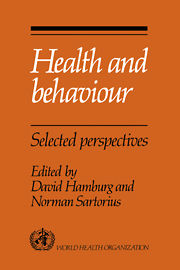Book contents
- Frontmatter
- Contents
- List of contributors
- Preface
- Acknowledgements
- List of abbreviations
- 1 Social and behavioural determinants of mental disorders
- 2 Food-related behaviour
- 3 The psychosocial environment and the development of competence in children
- 4 Children in danger
- 5 Adolescent health care and disease prevention in the Americas
- 6 Social networks and mental disorder (with special reference to the elderly)
- 7 Mental health aspects of general health care
- 8 The sociology of health care in developing countries
- 9 Population movements and health: global research needs
- 10 Health and behaviour: a worldwide perspective
- Index
Preface
Published online by Cambridge University Press: 06 August 2010
- Frontmatter
- Contents
- List of contributors
- Preface
- Acknowledgements
- List of abbreviations
- 1 Social and behavioural determinants of mental disorders
- 2 Food-related behaviour
- 3 The psychosocial environment and the development of competence in children
- 4 Children in danger
- 5 Adolescent health care and disease prevention in the Americas
- 6 Social networks and mental disorder (with special reference to the elderly)
- 7 Mental health aspects of general health care
- 8 The sociology of health care in developing countries
- 9 Population movements and health: global research needs
- 10 Health and behaviour: a worldwide perspective
- Index
Summary
Human behaviour is a key to health, and changes in behaviour have a profound influence on patterns of morbidity, and mortality from disease.
This fact is not a new discovery. From the earliest days of human history, behaviour has been the focus of most of the action aiming to prevent and treat illness. Dietary and hygienic prescriptions are embedded in most religions and rituals of mourning are undertaken by the bereaved to help them overcome stress. Societal relations are regulated to strengthen supportive social networks. In the past, links between behavioural change and the course of disease were frequently not well understood, and behavioural action was recommended because of the correlations observed – recommended nevertheless with force and insistence.
The twentieth century brought with it clear evidence of causal links between specific forms of behaviour – including attitudes, action and comprehension – and improvement or deterioration of health states. An impressive amount of literature has been produced over the past decades in this area, and both the public and the scientific community have become acutely aware of the need to influence behaviour if progress is to be made in promoting health, preventing disease, or decreasing suffering of those in whom it has appeared. Insistence that appropriate action be taken has not only stemmed from scientists; government leaders have also addressed the question. The World Health Assembly, bringing together chief health executives from 160 member states, for example, has devoted much of its time to the discussion of this matter.
- Type
- Chapter
- Information
- Health and BehaviourSelected Perspectives, pp. ix - xPublisher: Cambridge University PressPrint publication year: 1989

